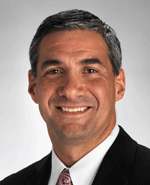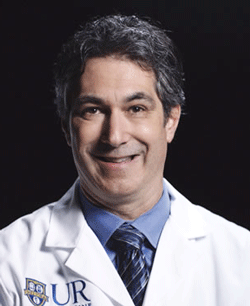 |
| |
|
|
|
|
|
|
|
|
|
|
|
|
|
|
|
|
|
|
|
|
INNOVATION IN THE ED: THE
ROLE OF BIOMARKERS FOR THE EVALUATION OF MILD TRAUMATIC
BRAIN INJURY
Live
event: November 10, 2022
An estimated 69 million patients1 worldwide sustain a traumatic brain injury (TBI) each year of which more than 80% are classified as mild (GCS 13 to 15)2. Due to the limitations of current evaluation tools, mTBI assessment can be time- and resource-consuming.
In the ED, the evaluation, diagnosis, and clinical decision making for patients suspected of mild traumatic brain injury (mTBI) can be challenging especially when an accurate history is not easily obtained, or patients are difficult to scan. In addition, current evaluation tools and techniques used in the ED are often subjective, resource consuming, or have low diagnostic yield. Join us as 2 experts provide the latest research and innovative approaches to improve patient care.
New developments in the use of brain injury biomarkers to help the assessment of patients suspected of mTBI have promise to aid in the evaluation and provide objectivity in conjunction with other clinical information. Two proteins in particular, Ubiquitin C-terminal hydrolase-L1 (UCH-L1) and Glial fibrillary acidic protein (GFAP), have the potential to reduce unnecessary CT scans, and improve operational efficiency.
1Dewan MC et al. J Neurosurg. 2004;43(suppl):113-125.
2Korley FK et al. J Head Trauma Rehabil. 2016;31(6):379-387.
|
|

JEFFREY BAZARIAN, MD, MPH
Dr. Bazarian is
tenured Professor of Emergency Medicine and Neurology at the
University of Rochester He is a graduate of Brown University
and the University of Rochester School of Medicine and
Dentistry. His research uses advanced brain imaging, helmet
sensors and blood sampling to investigate the effects of
concussion and repetitive head hits on the brain. Dr.
Bazarian was the lead author on the 2018 Lancet Neurology
publication detailing the results of the multi-national
study that was used to support FDA approval for the first
blood-based biomarkers of traumatic brain injury in the US.
He currently sees concussion patients in URMCs Child
Neurology Clinic. |
|

CHRIS DAVLANTES, MD, FACEP
Dr. Davlantes is the Sr. Director
of Global Medical Affairs at Abbott Point of Care.
Board-certified by the American Board of Emergency Medicine,
he has practiced Emergency Medicine for over 25 years and is
a Fellow of the American College of Emergency Physicians.
Dr. Davlantes has been an Assistant Professor at the
University of Kansas Hospital for the past 9 years, and is
still practicing Emergency Medicine part-time at Northwell
Health system’s Lenox Health Greenwich Village, a
free-standing ED. Dr. Davlantes has worked as a global
Medical Affairs leader in the medical device industry since
2012, where his focus and passion is to bridge innovative
technologies with clinical unmet needs to improve patient
outcomes around the globe. |
|
|
|
|
|
Learning Objectives:
•
Examine challenges and shortcomings with current approaches
to mTBI evaluation in the ED and review how to address them
through the latest research and innovations
•
Review the latest advancements in TBI biomarkers, including
identifying brain-specific biomarkers with characteristics
that offer diagnostic value in the ED
•
Describe how blood plasma-based biomarker testing can be
used in conjunction with other clinical information to aid
in the evaluation of suspected mTBI patients and reduce
diagnostic uncertainty
•
Demonstrate how biomarker-based testing can provide
objective assessment of suspected mTBI and examine the
potential to reduce unnecessary head CT, improve patient
care and satisfaction, and improve operational efficiency |
|
|
|
|
|
|
|
|
|
|
|
|
|
|
|
|
|
|
|
|
|
|
|
|
|
|
|
|
|
|
One P.A.C.E.®
contact hour will be provided for this basic level session
for six months following the live event.
Abbott is approved as a provider of continuing education
programs in the clinical laboratory sciences by the ASCLS
P.A.C.E.® Program. This session is approved for
one Florida CE credit. Florida Board of Clinical Laboratory
Personnel approved number: 50-12563 |
|
|
|
|
|
|
|
|
|
|
|
|
|
|
|
|
|
|
|
|
|
|
|
|
|
USING NEW TOOLS AND
TECHNIQUES TO ADVANCE CARE FOR MILD TRAUMATIC BRAIN INJURY
IN THE ED
Live event: June 8, 2022
In the ED, the evaluation, diagnosis and clinical decision
for patients suspected of mild traumatic brain injury (mTBI)
is often challenging. Current evaluation tools and
techniques used in the ED are often subjective, resource
consuming, or have low diagnostic yield. Join us as 2
experts provide the latest research and innovative
approaches to improve patient care.
New developments in the use of brain injury biomarkers to
help the assessment of patients suspected of mTBI have
promise to aid in the evaluation and provide objectivity in
conjunction with other clinical information. Furthermore,
significant progress has been made to understand how
physiologic, social, and environmental factors impact the
clinical manifestations of mTBI patients. Understanding the
mechanism and location of injury may facilitate improved
patient management and inform treatment.
Learning Objectives:
•
Review the latest research, best practices,
challenges and developments to advance assessment and care
for patients suspected of mTBI
•
Demonstrate how biomarker-based testing can provide
objective assessment of suspected mTBI and examine the
potential to reduce unnecessary head CT, improve patient
care and satisfaction, and improve operational efficiency
•
Examine how physiologic, social, and environmental
factors impact the clinical manifestations if
mTBI/concussion
•
Illustrate a multidisciplinary approach to the
neurobehavioral presentations of mTBI patients post
ED-discharge
|
|

SILVANA RIGGIO, MD
Silvana Riggio,
MD, Professor of Neurology and Psychiatry, Rehabilitation
Medicine and Human Performance, Icahn School of Medicine at
Mount Sinai
Dr. Riggio is a Professor of Neurology, Psychiatry and
Rehabilitation Medicine at the Icahn School of Medicine at
Mount Sinai. Dr. Riggio trained in Neurology at Georgetown
University and fellowship trained in neuro-electrophysiology
at John Hopkins and in Clinical Epilepsy at the Medical
College of Pennsylvania. She served as the Co-Director of
the Mid- Epilepsy Center and the Director of the Epilepsy
Program at Mayo Clinic Jacksonville.
Dr. Riggio also trained in Psychiatry at Cornell Weill
Medical Center. Dr. Riggio has lectured globally and
participated on National Committees related to TBI including
the ACEP-CDC guidelines task force on mild TBI published in
December 2008 and a CDC project on discharge instructions
for mild TBI patients. She was a task force member of the
CDC/DoD Concussion definition consortium, the Medical
Director for the NFL Neurological Care Program at Mount
Sinai and served as an independent Neuro Trauma Consultant
for the NFL. Dr. Riggio has authored over 50 articles and
book chapters, has edited 7 books and journal supplements,
and co-authored one book. She has also been the primary
investigator or co-investigator for 22 grants.
|
|

CHRIS DAVLANTES, MD, FACEP
Chris Davlantes, MD,
FACEP, Emergency Medicine Physician, Senior Director, Global
Medical Affairs, Abbott
Dr. Davlantes is the Sr. Director of Global Medical Affairs
at Abbott Point of Care. Board-certified by the American
Board of Emergency Medicine, he has practiced Emergency
Medicine for over 25 years and is a Fellow of the American
College of Emergency Physicians. He completed his medical
school training at Indiana University School of Medicine and
his residency training at University of Illinois’ College of
Medicine in Peoria.
Dr. Davlantes has held the position of Assistant Professor
in the Department of Emergency Medicine at the University of
Kansas Hospital for the past 9 years, and he is still
practicing Emergency Medicine part-time at Northwell Health
system’s Lenox Health Greenwich Village, a free-standing ED
located in Manhattan, New York City, where he and his wife
relocated during the beginning of the COVID-19 pandemic. Dr.
Davlantes has been working as a global Medical Affairs
leader in the medical device industry since 2012, where his
focus and passion has been to bridge innovative technologies
with clinical unmet needs in order to improve patient
outcomes around the globe. |
|
|
|
|
|
|
|
|
|
|
|
|
|
|
|
|
|
|
|
One P.A.C.E.®
contact hour will be provided for this basic level session
for six months following the live event.
Abbott is approved as a provider of continuing education
programs in the clinical laboratory sciences by the ASCLS
P.A.C.E.® Program. This session is approved for
one Florida CE credit. Florida Board of Clinical Laboratory
Personnel approved number: 50-12563 |
|
|
|
|
|
|
|
|
|
|
|
|
|
|
|
|
|
|
|
|
|
|
CHALLENGES IN MILD
TRAUMATIC BRAIN INJURY (MTBI) ASSESSMENT AND THE NEXT
FRONTIER IN BIOMARKER TESTING
Live event: November 11, 2021
An estimated 69 million patients1 worldwide
sustain a traumatic brain injury (TBI) each year of which
more than 80% are classified as mild (GCS 13 to 15)2.
Due to the limitations of current evaluation tools, mTBI
assessment can be time- and resource-consuming.
Join leading experts in an
upcoming webinar to learn about the latest research into
blood plasma-based biomarkers and their potential to predict
the absence of intracranial injury. During this webinar,
you’ll hear how two proteins, Ubiquitin C-terminal
hydrolase-L1 (UCH-L1) and Glial fibrillary acidic protein
(GFAP), have emerged as promising biomarkers that can be
used in conjunction with other clinical information to aid
in the evaluation of suspected mTBI patients in the ED.
1Dewan MC et al. J
Neurosurg. 2004;43(suppl):113-125.
2Korley FK et al. J
Head Trauma Rehabil. 2016;31(6):379-387.
Learning Objectives:
•
Examine challenges and shortcomings of the current
approaches to mTBI evaluation in the ED
•
Review the latest advancements in TBI biomarkers,
including identifying brain-specific biomarkers with
characteristics that offer diagnostic value in the ED
•
Describe how blood plasma-based biomarker testing can
be used in conjunction with other clinical information to
aid in the evaluation of suspected mTBI patients and reduce
diagnostic uncertainty by providing the quantitative
measurement of biomarkers producing an objective
interpretation.
•
Examine the potential for biomarker testing to reduce
unnecessary head CT, improve patient care and satisfaction,
and improve operational efficiency
|
|

PROFESSOR PETER
BIBERTHALER, MD
Professor Peter
Biberthaler’s research activities concentrate on his core
clinical focus areas. A very important aspect of these focus
areas is the care of severe and multiple trauma patients, a
major part of which is the treatment of traumatic brain
injuries.
Professor Biberthaler’s other major focus area, shoulder
surgery, is the logical consequence of his scientific
research and clinical practice in the field of traumatology.
He is the first person to have been able to visualize the
blood circulation in direct proximity to ruptures by means
of intraoperative intravital-microscopic imaging. |
|

PAUL JARVIS, MD, BSC(HONS)
MBCHB MRCP FRCEM DIP MED ED MSC
Dr. Jarvis is the
Director of Global Medical Affairs at Abbott Point of Care.
In addition, he is a practicing Emergency Medicine Physician
working in the North of England. He has over 20 years of
clinical experience with particular interests in
Neurological Emergencies and Trauma management. He has a
Masters Degree in Quality Improvement from Ashridge Business
School, United Kingdom. Parallel to his clinical work, Paul
ran a global management consultancy for 5 years, helping
hospitals around the world improve their patient flow. |
|
|
|
|
|
|
|
|
|
|
|
|
|
|
|
|
|
|
|
One P.A.C.E.®
contact hour will be provided for this basic level session
for six months following the live event.
Abbott is approved as a provider of continuing education
programs in the clinical laboratory sciences by the ASCLS
P.A.C.E.® Program. This session is approved for
one Florida CE credit. Florida Board of Clinical Laboratory
Personnel approved number: 50-12563 |
|
|
|
|
|
|
|
|
|
|
|
|
|
|
USING BIOMARKERS FOR
OBJECTIVE ASSESSMENT OF MILD TRAUMATIC BRAIN INJURY
Live event: July 22, 2021
Traumatic brain injury (TBI) is evaluated during ~5 million
ED visits annually1 of which more than 80% are
classified as mild (GCS 13 to 15)2. Due to the
limitations of current evaluation tools, mTBI assessment can
be time- and resource-consuming.
Join leading experts in an upcoming webinar to learn about
the latest research into blood-based biomarkers and their
potential to predict the absence of intracranial injury.
During this webinar, you’ll hear how two proteins, Ubiquitin
C-terminal hydrolase-L1 (UCH-L1) and Glial fibrillary acidic
protein (GFAP), have emerged as promising biomarkers that
can be used in conjunction with other clinical information
to aid in the evaluation of suspected mTBI patients in the
ED.
1Korley FK et al. J Head Trauma Rehabil.
2016;31(6):379-387.
2Dewan MC et al. J Neurosurg.
2004;43(suppl):113-125.
Learning Objectives:
•
Examine challenges and shortcomings of the current
approaches to mTBI evaluation in the ED
•
Review the latest advancements in
TBI biomarkers, including identifying brain-specific
biomarkers with characteristics that offer diagnostic value
in the ED
•
Describe how blood-based biomarker
testing can be used in conjunction with other clinical
information to aid in the evaluation of suspected mTBI
patients and reduce diagnostic uncertainty by providing a
quantifiable objective assessment
•
Examine the potential for
biomarker testing to reduce unnecessary head CT, improve
patient care and satisfaction, and improve operational
efficiency
|
 |

JESSE M. PINES, MD, MBA, MSCE
Jesse Pines MD, is the National
Director of Clinical Innovation at US Acute Care Solutions
and a Professor of Emergency Medicine at Drexel University.
Dr. Pines leads USACS’s efforts in telemedicine, alternative
payment models, and opioids. Dr. Pines is a nationally known
expert in ED quality of care, innovation, and health
services research, and has published more than 330
peer-reviewed publications and six books. Before joining
USACS in 2018, he served as the Director of the Center for
Healthcare Innovation and Policy Research and Professor at
George Washington University and Professor, and also
previously was Assistant Professor at the University of
Pennsylvania.

PAUL JARVIS, MD,
BSC(HONS) MBCHB MRCP FRCEM DIP MED ED MSC
Dr. Paul Jarvis is
the Director of Global Medical Affairs at Abbott Point of
Care. In addition, he is a practicing Emergency Medicine
Physician working in the North of England. He has over 20
years of clinical experience with particular interests in
Neurological Emergencies and Trauma management. He has a
Masters Degree in Quality Improvement from Ashridge Business
School, United Kingdom. Parallel to his clinical work, Paul
ran a global management consultancy for 5 years, helping
hospitals around the world improve their patient flow.
|
 |

JEFFREY BAZARIAN, MD
Dr. Jeffrey Bazarian is a
Professor of Emergency Medicine and Neurology with an
active, interdisciplinary, clinical research program in mild
TBI and sport concussions at the University of Rochester. He
has served as the lead investigator on projects to determine
the epidemiology and outcome of mild TBI (K23 from NINDS),
to image with DTI axonal injury acutely after mild TBI (R01
from NICHD), to determine the role of serum S100B in the
diagnosis of intracranial hemorrhage after mild TBI (New
York State Department of Health), to validate new putative
markers of axonal injury (K24 NICHD), and to investigate the
nature of white matter damage after multiple sub-concussive
head blows (NFL-Charities). His lab’s translational research
platform involving contact athletes at the University of
Rochester and Rochester Institute of Technology incorporates
DTI, fMRI, and cognitive/balance performance with head
accelerometer data, as well as with serum and whole blood
sampling for protein and genetic analysis, respectively.
|
|
|
|
|
|
|
|
| |
| One P.A.C.E.®
contact hour will be provided for this basic level session
for six months following the live event.
Abbott is approved as a provider of continuing education
programs in the clinical laboratory sciences by the ASCLS
P.A.C.E.® Program. This session is approved for
one Florida CE credit. Florida Board of Clinical Laboratory
Personnel approved number: 50-12563 |
|
|
|
|
|
|
|
TRAUMATIC BRAIN INJURY BEST
PRACTICES AND OPPORTUNITIES: FROM ACUTE EVALUATION TO
POST-DISCHARGE
Live event: December 7, 2020
Worldwide each year, 50 million+ people sustain a traumatic
brain injury (TBI). Symptoms resolve quickly for many
patients, while others can take several weeks to months for
post-concussive symptoms to resolve, and yet another subset
of patients continue to experience persistent symptoms for 3
months or more after injury. However, due to the limitations
of currently used evaluation tools, TBI can be challenging
to adequately screen, manage and develop therapeutic
treatments to improve outcomes.
Hear from leading experts about effective strategies and
trends related to head injury evaluation and an update
regarding potential advances in biomarker research.
Biomarkers have the potential to aid in the evaluation of
TBI and have demonstrated the ability to predict the absence
of intracranial injury. Two proteins, Ubiquitin C-terminal
hydrolase-L1 (UCH-L1) and Glial fibrillary acidic protein
(GFAP), have emerged as promising biomarkers for clinical
use to predict traumatic intracranial injuries on head CT
scan acutely after TBI.
Learning Objectives:
•
Describe unmet needs and
challenges regarding the current tools and approach to
traumatic brain injury evaluation
•
Examine how the current approach to TBI evaluation
impacts patient care and burden to the hospital
•
Discuss the long-term impact of mild TBI and what
Emergency Departments can do to improve outcomes
•
Identify developments regarding the use of biomarkers
for TBI evaluation and discuss the ways in which biomarkers
may be used in the future clinically to improve patient care
|
 |

ALASTAIR M. JONES, MBCHB,
FRCEM, PGDIP
Dr Alastair Jones is a Consultant
in Emergency Medicine at the Bradford Teaching Hospitals
Foundation Trust. Alastair qualified in Medicine from the
University of Sheffield in 2003. He obtained Fellowship to
the Royal College of Emergency Medicine in 2011 and
Membership to the Faculty of Sports and Exercise Medicine in
2019. He also achieved a Post-Graduate Diploma in Sports and
Exercise Medicine from the University of Bath in 2016. His
areas of clinical interest include Musculoskeletal Medicine,
Sports and Exercise Medicine, and Sports Concussion.
Alastair developed and leads the Bradford Royal Infirmary
Acute Musculoskeletal Clinic, a multidisciplinary clinic for
patients with musculoskeletal injuries.
Dr. Jones is also heavily involved
in Sports and Exercise Medicine and held the post of Head of
Medical Services for Leeds Rugby where he oversaw the
medical departments of both Leeds Rhinos Rugby League and
Yorkshire Carnegie Rugby Union. He currently provides
medical services for the Rugby Football Union as the course
director for the Rugby Football Unions Pre-Hospital
Immediate Care in Sport Course and forms part of the
Twickenham Stadium international match day medical team. He
also works as a match day doctor for Premiership Rugby. Dr.
Jones previously worked for Tonga during the 2013 Rugby
League World Cup and held the role of Immediate Care Doctor
at the 2015 Rugby Union World Cup and 2016 Rugby Union
Junior World Cup. |
 |

THOMAS K. WATANABE, MD
Thomas Watanabe, MD is Clinical
Director of the Drucker Brain Injury Center at MossRehab,
director of the MossRehab Stroke program and Associate
Professor in the Department of Physical Medicine and
Rehabilitation at the Temple University School of Medicine
in Philadelphia. He oversees the clinical aspects of the
inpatient and outpatient brain injury and stroke programs as
well as participating in the strategic planning for programs
at MossRehab in general. He is also actively involved in the
training of residents and medical students in the medical
care and rehabilitation of persons with neurological
diagnoses.
Dr. Watanabe is a co-investigator on the current Traumatic
Brain Injury Model System grant supported by the NIDILRR and
has participated in several other clinical trials related to
recovery after stroke and brain injury. He has authored or
co-authored several peer-reviewed articles directly related
to the treatment of individuals with acquired brain injuries
as well as other invited articles and book chapters. Dr.
Watanabe is on the editorial board of The Journal of Head
Trauma Rehabilitation. He has also given many local,
regional, national and international presentations to health
care professionals on various aspects of neurorehabilitative
care. |
|
|
|
|
|
|
|
|
|
| |
| One P.A.C.E.®
contact hour will be provided for this basic level session
for six months following the live event.
Abbott is approved as a provider of continuing education
programs in the clinical laboratory sciences by the ASCLS
P.A.C.E.® Program. This session is approved for
one Florida CE credit. Florida Board of Clinical Laboratory
Personnel approved number: 50-12563 |
|
|
|
|
|
|
|
ADVANCES IN TRAUMATIC
BRAIN INJURY EVALUATION AND MANAGEMENT
Live event: July 23, 2020
Worldwide each year, 50 million+ people sustain a traumatic
brain injury (TBI); most cases are mild with variable
clinical outcomes and lasting symptoms1. Hear from leading
experts about effective strategies and trends related to
head injury evaluation. The latest blood-based biomarker
research and their potential to predict the absence of
intracranial injury will also be presented.
This webinar will discuss how
biomarkers may be used in the future clinically to improve
patient care in the hospital and outpatient care setting. It
will also identify the role of brain biomarker tests in the
hospital performance.
Learning Objectives:
• Describe unmet needs and
challenges regarding the current tools and approach to
traumatic brain injury evaluation
• Examine how the current approach to TBI evaluation impacts
patient care and burden to the hospital
• Identify developments regarding the
use of biomarkers for TBI evaluation
• Discuss the ways in which biomarkers may be used in the
future clinically to improve patient care in the hospital
and outpatient care setting
• Assess the role of brain biomarker tests in the hospital
performance
1 Nelson LD et al. Recovery
after mild traumatic brain injury in patients presenting to
US level I trauma centers. JAMA Neurol.2019;76(9):1049.
|
 |

JEFFREY J. BAZARIAN, MD,
MPH
Dr. Bazarian is Professor of
Emergency Medicine and Neurology at the University of
Rochester. He is a graduate of Brown University and the
University of Rochester School of Medicine and Dentistry. He
is board certified in Internal Medicine and Emergency
Medicine but practiced Emergency Medicine exclusively for 22
years until 2012. In 2010, Dr. Bazarian joined the
University of Rochester Sports Concussion Clinic, providing
outpatient concussion care to area high school and collegiate
athletes.
Dr Bazarian’s research is focused on developing
neuroimaging and blood-based biomarkers of axonal injury
after concussion and repetitive head hits, and the
pathophysiologic mechanisms of recovery. He, along with Dr
Welch, were lead authors on the 2018 Lancet Neurology
publication detailing the results of the multi-national
ALERT-TBI trial used to support FDA clearance of the first
test to use blood-based biomarkers of traumatic brain injury
in the US.
|
 |

ROBERT D. WELCH, MD, MS,
FACEP,
Dr. Welch is Professor,
Clinical Educator, in the Department of Emergency Medicine
and is the Director of the Biostatistics and Epidemiology
Research Design Group. He is a member of the Cardiovascular
Research Institute and an Associate in the Department of
Physical Medicine and Rehabilitation at Wayne State
University School of Medicine in Detroit, Michigan.
Dr.
Welch completed his MD degree at Wayne State University
School of Medicine, his residency in Emergency Medicine at
Detroit Receiving Hospital / Wayne State University, and a
M.S. in Clinical Research Design and Statistical Analysis at
the University of Michigan. Rob’s interests include
neurological emergencies, clinical trials methodology and
heart disease. He was the Program Director of the Wayne
State University Neurological Emergencies Treatment Trials
Network from 2007 – 2018 and held numerous clinical research
contracts with foundations and industry.
|
|
|
|
|
|
|
| |
| One P.A.C.E.®
contact hour will be provided for this basic level session
for six months following the live event.
Abbott is approved as a provider of continuing education
programs in the clinical laboratory sciences by the ASCLS
P.A.C.E.® Program. This session is approved for
one Florida CE credit. Florida Board of Clinical Laboratory
Personnel approved number: 50-12563 |
|
|
|
| |
| |

